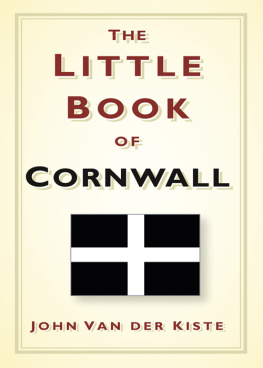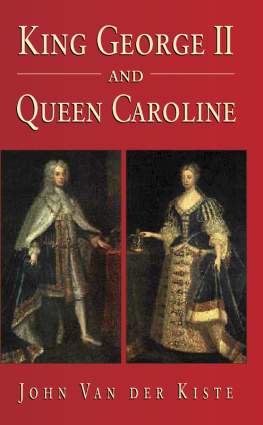John Van der Kiste - The Little Book of Devon
Here you can read online John Van der Kiste - The Little Book of Devon full text of the book (entire story) in english for free. Download pdf and epub, get meaning, cover and reviews about this ebook. year: 2013, publisher: The History Press, genre: Detective and thriller. Description of the work, (preface) as well as reviews are available. Best literature library LitArk.com created for fans of good reading and offers a wide selection of genres:
Romance novel
Science fiction
Adventure
Detective
Science
History
Home and family
Prose
Art
Politics
Computer
Non-fiction
Religion
Business
Children
Humor
Choose a favorite category and find really read worthwhile books. Enjoy immersion in the world of imagination, feel the emotions of the characters or learn something new for yourself, make an fascinating discovery.
- Book:The Little Book of Devon
- Author:
- Publisher:The History Press
- Genre:
- Year:2013
- Rating:3 / 5
- Favourites:Add to favourites
- Your mark:
- 60
- 1
- 2
- 3
- 4
- 5
The Little Book of Devon: summary, description and annotation
We offer to read an annotation, description, summary or preface (depends on what the author of the book "The Little Book of Devon" wrote himself). If you haven't found the necessary information about the book — write in the comments, we will try to find it.
The Little Book of Devon — read online for free the complete book (whole text) full work
Below is the text of the book, divided by pages. System saving the place of the last page read, allows you to conveniently read the book "The Little Book of Devon" online for free, without having to search again every time where you left off. Put a bookmark, and you can go to the page where you finished reading at any time.
Font size:
Interval:
Bookmark:
THE
LITTLE
BOOK
OF
DEVON
JOHN VAN DER KISTE

First published 2011
The History Press
The Mill, Brimscombe Port
Stroud, Gloucestershire, GL5 2QG
www.thehistorypress.co.uk
This ebook edition first published in 2013
All rights reserved
John Van der Kiste, 2011, 2013
The right of John Van der Kiste to be identified as the Author of this work has been asserted in accordance with the Copyright, Designs and Patents Act 1988.
This ebook is copyright material and must not be copied, reproduced, transferred, distributed, leased, licensed or publicly performed or used in any way except as specifically permitted in writing by the publishers, as allowed under the terms and conditions under which it was purchased or as strictly permitted by applicable copyright law. Any unauthorised distribution or use of this text may be a direct infringement of the authors and publishers rights, and those responsible may be liable in law accordingly.
EPUB ISBN 978 0 7509 5394 8
Original typesetting by The History Press
CONTENTS
ACKNOWLEDGEMENTS
I can claim to be a Devonian not by birth, as my mother was, but by virtue of having lived in the county since I was barely three years old. Some half a century after being brought here, in assembling the present volume I have thoroughly relished the task of trawling through a variety of sources including books, pamphlets, old newspapers and journals, websites, and last but not least my admittedly less than perfect memory.
I would like to acknowledge my debt in particular to Brian Moseleys Plymouth Data, Derek Taits Plymouth Local History, Tim Sandless Legendary Dartmoor, and David Cornforths Exeter Memories, all online; the vast collection of books I have used in my researches, particularly W.G. Hoskins magisterial Devon, a title no county enthusiast should be without; my wife Kim, for her ever-helpful reading of the draft manuscript prior to publication; and to my publishers at The History Press.
In conclusion, this book is dedicated to Kim and to the memory of my parents Kate and Guy.
John Van der Kiste, 2011
ROYALTY & POLITICS
ROYAL DEVON
William the Conqueror
William I came to Exeter in or around March 1068. The city had been the home of Gytha, mother of King Harold who had been defeated and killed at the Battle of Hastings in 1066, and the people rebelled against William, not only because of their allegiance to her, but also because the Normans were demanding high taxes to which they objected. When the king and his army arrived at the city gates they found their way barred, and they laid siege to it for eighteen days until the citizens gave in and agreed to make peace. The king conceded, and allowed Gytha to go into peaceful exile. As part of the settlement he built Rougemont Castle, so named because of the hill of red earth on which it stood. Exeter and Okehampton, also the site of a castle, were left in charge of his henchman Baldwin de Redvers, whom he appointed Sheriff of Devon.
Catherine of Aragon
As far as historical records show, Princess Catherine of Aragon was the next member of royalty to visit Devon. In October 1501 she sailed from Spain to England to become the bride of Arthur, Prince of Wales, the eldest son of King Henry VII. She landed at the Barbican, and in the words of one effusive contemporary scribe, had she been the saviour of the world, she could not have had a more enthusiastic welcome. She went to St Andrews Church to give thanks for the safe ending of a stormy and unpleasant voyage, then stayed in a local merchants house before going to London for her wedding in November. Prince Arthur had always been sickly and he died in April 1502 of what was referred to as the sweating sickness. She remained in England as a widow, and a few weeks after the new Prince of Wales ascended the throne as King Henry VIII, they were married. Her one surviving daughter later became Queen Mary (Bloody Mary), but after she repeatedly failed to give the king a living son and heir, Henry divorced Catherine and she died in 1536.
Princess Henrietta Anne
Henrietta Anne, youngest daughter of King Charles I and Queen Henrietta Maria, was the only child of a reigning English sovereign ever born in Devon. In the summer of 1644, during the Civil War, the queen had been in Oxford, but parliamentary forces were building up in the area and it was thought advisable for her to seek safety elsewhere, especially as she was expecting a child. In May she reached Exeter and stayed at Bedford House, where the princess was born on 16 June. In order to avoid capture, the queen left the city two weeks later for France, leaving the child in the care of a lady-in-waiting, Lady Dalkeith. The princess was baptised in Exeter Cathedral on 21 July. King Charles arrived in the city later that week, and the city fathers made large gifts of money to him, the Prince of Wales and various royal officials as an expression of loyalty. A grateful king knighted the mayor, Hugh Crocker.
Charles II
During the reign of King Charles II, the Royal Citadel at Plymouth was built. Unlike most of the West Country, Plymouth had been strongly pro-Cromwell during the Civil War, but their disillusion with the Commonwealth set in after Cromwells death and an acute shortage of money which resulted in the seamen not being paid. However, the restoration of the monarchy was seen as a possible return to better times for the town. This coincided with disputes between Holland and France, and in 1665 it was decided to construct a fortress on Plymouth Hoe for defence purposes. The kings main reason for building the Citadel was ostensibly because he recognised the strategic importance of Plymouth as a coastal town when it came to war on Englands enemies, though it was believed for some years that he had been angered by the towns unfriendly attitude towards his father and therefore sought some kind of revenge, or at least wished to overawe the town as well as his foes across the Channel, although there is no firm evidence to support this view.
The king paid at least one visit to the area during its construction. Above the gateway in Hoe Road is the royal coat of arms supported by a lion and a unicorn, and the date 1670, with a tablet inscribed, Carolus Secundus Dei Gratiae Magnae Britanniae Franciae at Hiberniae Rex (British sovereigns did not formally relinquish the style of King of France until the Act of Union in 1801). It had always been intended that a statue of the king would be placed there, but there is some doubt as to whether such a work of art was ever completed.
William III
During the Glorious Revolution, William, Prince of Orange, landed at Brixham on 5 November 1688, an invasion which culminated in he and his wife Mary replacing her unpopular father, King James II, on the throne. On their first night there, some of his soldiers found billets in the local cottages, though he himself made do with a mattress on the floor of a fishermans hut. After spending a night at Paignton, they entered Exeter on their march towards London on 9 November. Four weeks later James abdicated, throwing the Great Seal into the Thames as he fled into exile, and William and Mary became joint sovereigns in his place.
George III and his family
Since the reign of King George III, every British sovereign has visited Devon at least once, though in some cases not necessarily after they ascended to the throne. George III, Queen Charlotte and their eldest daughters, Princesses Charlotte, the Princess Royal Augusta, and Elizabeth, came to Plymouth in the summer of 1789. They stayed at Saltram House, and during their few days in the area they visited the towns new theatre in George Street, named the Theatre Royal in the kings honour. He also visited a new dock which was then under construction, the Citadel and the Victualling Office. The most spectacular event of their visit was a review of the fleet and a mock naval battle in the Sound, with about a hundred ships taking part.
Next pageFont size:
Interval:
Bookmark:
Similar books «The Little Book of Devon»
Look at similar books to The Little Book of Devon. We have selected literature similar in name and meaning in the hope of providing readers with more options to find new, interesting, not yet read works.
Discussion, reviews of the book The Little Book of Devon and just readers' own opinions. Leave your comments, write what you think about the work, its meaning or the main characters. Specify what exactly you liked and what you didn't like, and why you think so.
















